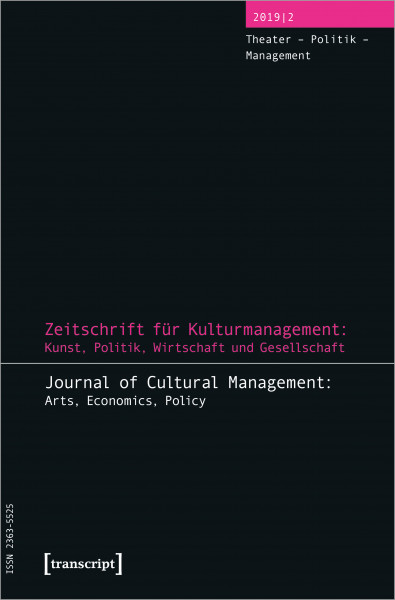Research Article
The audience of public and private theaters
Social characteristics, profiles of interest and ways of cultural participation
Abstract
Private theatres play a marginal role in public cultural debates, but they have a larger number of visits each year than publicly funded theatres (“Schauspielhaus”). In which ways the audiences differ in social characteristics, interests and cultural engagement is analyzed in the article, based on German audience and population surveys. It turns out that large overlaps exist between the audiences and that the differences in characteristics are gradual rather than basic. People who attend performances in private theatres are somewhat older and have a somewhat lower education than people who go to a “Schauspielhaus”. Moreover they are somewhat less interested in the high culture and less culturally engaged. Compared to the general population the theater audience as a whole is slightly above average in age. It is not known to which extent private theatre audiences have a greater share nowadays in theatre audiences than in earlier years. There are some indications that they might have undergone the same transformation in relationship to age as the publicly funded theatres: from an overrepresentation of the younger to an overrepresentation of the older ones.
Keywords
2019 (2)
Theatre – Politics – Management

Related Articles
Money Talks
Über die Nichtneutralität von Geld in der KulturfinanzierungJournal of Cultural Management 2015 (2)
Research Article
Journal of Cultural Management 2016 (2)
Research Article
Darwin in der Oper?
Ein evolutionstheoretischer Blick auf KulturYearbook for Culture Management 2010
Research Article
Yearbook for Culture Management 2010
Essay
Means-end-Evaluation am Beispiel des Technorama
Journal of Cultural Management 2017 (1)
Case Study
Yearbook for Culture Management 2013
Essay
© 2024, Journal of Cultural Management and Cultural Policy
Keywords
- aesthetics
- higher education
- cultural diplomacy
- career, professional role
- audience studies
- Business
- digitalization, digitization
- diversity
- empirical aesthetics
- entrepreneurship
- development, transformation
- ethics
- Evaluation
- festival
- film
- social change
- ideology
- staging
- communication
- Concert
- creativity
- culture
- arts organizations, cultural organizations
- fincancing the arts
- cultural history
- cultural economy
- art education
- cultural policy
- cultural sociology
- audience development, art education
- arts administration, arts management
- cultural industry
- cultural sciences
- art
- arts research
- curating
- artists
- leadership
- management
- marketing
- market
- media
- methods development
- museum
- music
- opera
- orchestra
- organization
- law
- social cohesion
- community arts
- state
- urbanism
- dance
- theater
- theory development
- tourism
- civil society, third sector


